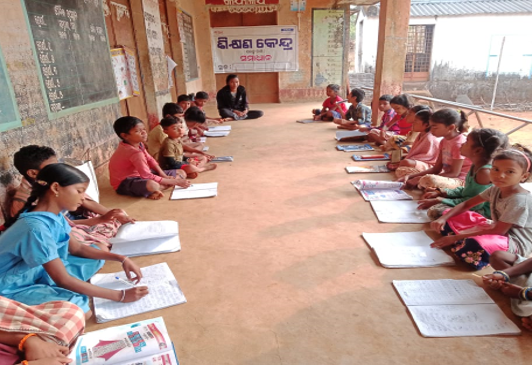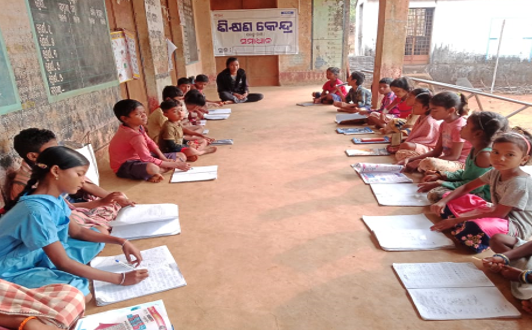TBB BUREAU
BHUBANESWAR, FEB 13, 2023
The COVID-19 outbreak highlighted the fundamental disparities across Indian societies. The education of millions of students in India was disrupted by extensive lockdowns, and many did not return when schools reopened.
According to a report released on November 29, 2022, by the Bharat Rural Livelihoods Foundation (BRLF), an independent agency established by the Union Cabinet under the Ministry of Rural Development (MoRD) in 2013, about 50% of students in tribal areas drop out of school before finishing Class 8. However, the digital divide and loss of learning continuity have widened these gaps and lowered children’s confidence.
The wide digital divide and lack of access to educational support in tribal-dominated areas of Odisha have resulted in a sharp increase in school dropouts. Lack of access to essential information, hygiene practices, and nutrition pushed households into hunger and malnutrition, particularly those with lactating mothers and adolescents. The Centre for Youth and Social Development (CYSD), founded in 1982, works tirelessly to combat inequality and envisions a just and inclusive society for Odisha’s tribal, rural, and urban poor.

Headquartered in Bhubaneshwar, CYSD initiated an innovative project ‘SAMADHAN’. The project’s goal is to create a community-based learning ecosystem in which the community canplan, engage, and explore localized solutions. The project was selected as a finalist in the education category of the HCL Grant 2022.
The organization received a grant of INR 25lakhs from HCL Grant, a CSR commitment of HCLTech, through HCL Foundation, to implement the project across 45 hard-to-reach tribal villages in Malkangiri, one of the aspirational districts of Odisha. The aim was to fill the knowledge gaps for 1500tribal children aged between 6-14 years andthe project envisaged to use child-centric and innovative pedagogical practices, operating in joyful learning environments, supplementing the formal education of tribal children, with help of 15 passionate ‘GaonMitras’.
The project seeks to provide supplementary education to the tribal children and bridge their learning gap induced due to prolonged school closure which would address issues associated with learning deprivation through innovative approaches and to develop school linked creative learning centres where the children can learn, play and participate.
Through its HCL Grant project, CYSD increased community awareness,and helped in creating an enabling education eco-system in 45 tribal villages. The parents are now sending their children to the Creative Learning Centres and school regularly.The targeted children (girls – 649 & boys – 589) are provided with supplementary education there. The dropout students have been identified, out of which 13 children(girls – 7 & boys –6) have been mainstreamed.
Monthly meetings of the School Management Committees (SMCs) have been a regular practice in the operational areas. Motivation and school readiness among the children has increased. The children have developed the habit of attending classes in the Creative Learning Centres and then going to school regularly. This has resulted in increased attendance.
Students in the learning centres can read the textbooks developed in regional language, and solve simple numerical problems as per the classes they are enrolled in. The students practice their lessons, accomplish their home tasks and get their doubts cleared in the learning centres.Hygienic practices among the students have also increased.
Dr. Nidhi Pundhir, Vice-President, Global CSR, HCL Foundation, praised the project, saying, “No access to basic facilities puts vulnerable communities at risk. To empower the marginalized and break the cycle of silence and inequality, we must all work together. CYSD is acting as a supplement to bridge the digital divide while ensuring that the underserved communities benefit from government efforts, giving energy to the idea of Digital India. The damage is not irreversible. We must focus on the successful implementation of programs for sustainable development.”
CYSD, which was founded in 1982 by Jagadananda and Prafulla Kumar Sahoo, advocates for an inclusive development approach for every individual who has endured discrimination, and limited access to resources, services, entitlements, and social participation. Through capacity building, it seeks to achieve transparent, gender-sensitive, accountable, and democratic governance.
CYSD was initially instrumental in creating a favorable environment for a thriving voluntary sector in Odisha. With a primary goal of eradicating extreme poverty and hunger, some of their programs have had a significant impact, such as SAMVAD, which has helped 23,000+ tribal women and adolescent girls, Internet Saathi, which has assisted 1.7million women,and World on Wheels, which has benefitted 4000+ tribal school children.
Other interventions include improving rural livelihoods and food security, natural resource management, women’s entrepreneurship and localization of Sustainable Development Goals (SDGs). Some of these models were acknowledged by the government and replicated, for example, through Mission Shakti and Watershed Missions. CYSD is also working to strengthen community resilience to climate change and disasters.
 The Business Bytes
The Business Bytes
